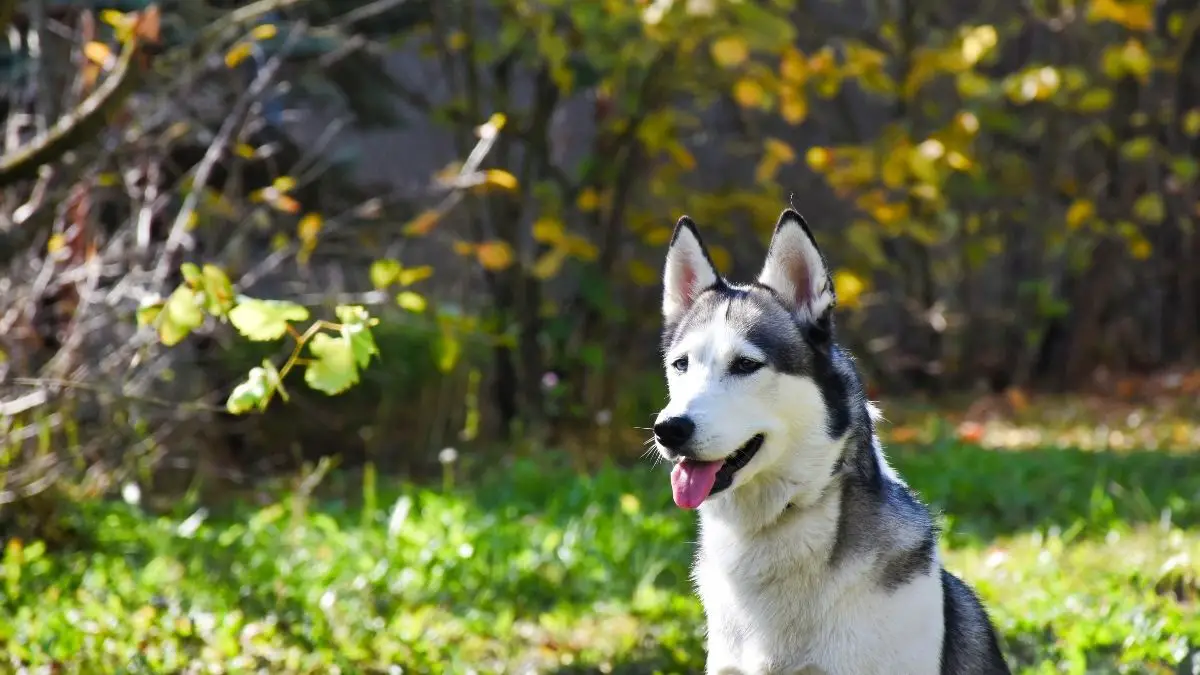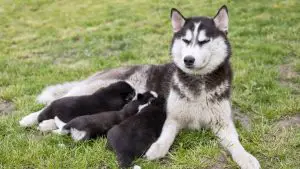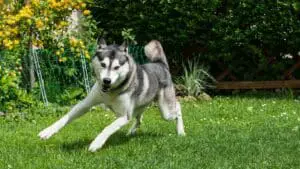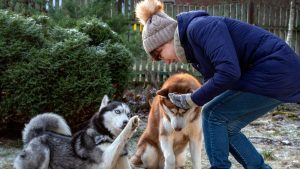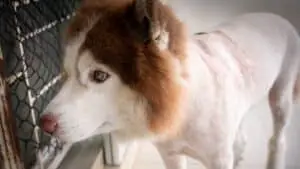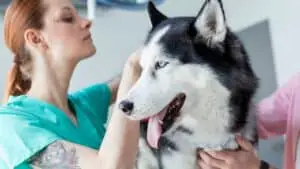When Do Huskies Stop Growing? Understand All Stages Of Development
Are you a fan of the Siberian Husky? Of course, you are. Why else would you be here? Huskies are charming personalities, and the moment you bring one home, you start wondering if they’d ever stop growing, given their adorableness.
But Huskies grow faster than you think!
So, when do Huskies stop growing? Huskies grow up to their maximum height within 18 months. However, they continue to get bigger and develop their strength until they’re 3. During this period, Huskies seem to go through physical and mental changes.
If you plan to get one of these charming little pups, it will help if you have sound knowledge about their growth cycle. So, why wait? Read on to gather the knowledge.
Table of Contents
About The Siberian Husky
Siberian Huskies are medium-sized handsome dogs with almond-shaped brown or blue eyes. Their eyes are the fascinating features that could win your heart at the first instant.
Huskies are quick and nimble-footed dogs with effortless gaits. They are incredibly powerful and typically weigh up to 60 pounds. Huskies tend to get bigger and bulkier with age.
These are born to be pack dogs who resemble wolves and love to be around their family. They are fond of running and love a vast space to play around.
Huskies have a minimal doggy odor and are naturally clean. When you get one, you’d be a forever Husky lover if you aren’t already!
When Do Huskies Stop Growing?
There are slight differences between the growth cycle of the male and female Huskies. However, both reach their mature height at 18 months. Their weights differ at different ages, and it keeps growing with time. Typically, their total weight comes when they’re 2-3 years old.
Males tend to be bigger and thus, keep increasing their size till the end of this timeline. On the contrary, females approach their full height at the beginning of their age.
However, the changes differ from dog to dog. Therefore, you’d notice the differences in them accordingly.
Although Huskies tend to reach their full height by 18 months, this is mainly towards the end. However, you may also find Huskies that stop growing after 12 months of age.
But, the height and the weight of a Husky are two different components. While growing in height may stop after 18 months, their weight would keep growing along with their size and muscles until they turn 2 or 3 years.
Usually, males gain their final size towards the end of this timeline, and females may reach their absolute weight by 2 years.
Growth At Different Developmental Stages
While you notice your Husky developing into an adult dog, certain things are helpful if followed.
Huskies need a substantial diet in their growing period to keep them nourished and sufficiently full. However, the food preferences may differ among different Huskies as they depend on various factors, such as their conditions.
The mental health growth of your Husky is as essential as their physical health growth. Such growth differs at different stages of their life. It is, therefore, necessary to look after every phase of their development.
Newborns
Newborns or Husky puppies that are 0-8 weeks old make you a mother too. You are looking after a baby at this stage.
Puppies aren’t sold at such an early stage, for they need to be around their mothers for the early nourishment. However, if you have a mother and her pups at home, you can be the pet parent of all of them and help the Husky mother look after her newborns.
The Husky pups will move around for their mother’s milk and slowly open their eyes when it’s time. As a pet parent, it will be your responsibility to check if all the pups get enough milk and are safe during this crucial stage.
It is vital to keep the pups with their mother to ensure the best possible health of the puppies in those eight weeks. Early separation from their mother might result in stunted growth or other serious problems.
8 – 20 Weeks
Puppies at this age can get super curious about every little thing around them. They’d want to socialize, so it is essential to mix up with them so they become friendly dogs.
Huskies mentally develop when they explore more, and while in the process, it is vital to help them overcome fear. Make sure not to indulge them more than required.
This is the time where they slowly start their growing cycle at a consistent pace. Ensure that your pup is getting enough food. During this stage, they turn to be energetic. Ensure that they get access to large, open spaces to play and run.
While you engage them in early socialization, you should ensure that they mix up with other dogs as well. This would help them eliminate their aggressive side while interacting with other dogs later in life.
Puppyhood
Puppyhood is a crucial growing stage for Huskies. Within a couple of months, they’ll grow at a faster rate. So, it is vital to feed them with enough and healthy food and clean water.
This stage also marks the beginning of their official training period for them to develop their behavior patterns.
Between the age of 3-6 months, you should start training your Husky. It is the best time for your pup to develop their personality traits so that they come out to be stronger in the application. You can teach them tricks and tips for their mental stimulation so that they develop their mental capacity.
Adulthood
As your Husky nears turning a year old, they will be approaching their maximum height. However, note that some Huskies might take additional six months to reach their full size.
Also, Huskies continue gaining weight even after full-height attainment. Ensure that your Husky fulfills its daily physical quotient.
Time would come when the growth slows down with minor changes in your Husky. Within two years of age, they’ll reach their emotional maturity.
Continue interacting and feeding your Husky well. Both are essentials for a Husky to develop in their growing stages. If you prefer training your Husky for a sled, work, or any other specific service dog, make sure to start early and feed them with a proper, regular diet by consulting the vet.
Also, continue interacting and playing with them.
Factors That Affect The Husky’s Growth
Keeping track of your Husky’s growth can be challenging. It is almost impossible to determine the size of a Husky. However, you should be well-informed about the factors that affect the development of a Husky before you bring one home.
Genetics
If you are concerned about the size of your Husky, looking at their parents should give you an idea. Genetics plays a vital role in determining the size and height of a dog.
Large and bulky parents would most probably produce the same kind of pup who’d grow up to be large. Moreover, the color and the coat also come from hereditary factors.
Nutrition
Plenty of nutrition and calories await your pup’s health to help them in their growing stage. Ensure to feed them with quality foods with vitamins, minerals, and valuable nutrients for their health.
Any lack in their diet may cause a disturbance in their growth cycle and result in your dog’s weak bones.
Injury
Huskies are playful and curious dogs who enjoy playing and running in open spaces. As such, they are highly prone to injuries. Early injuries may lead to stunted maturity of their bones.
However, playing is also essential for their healthy lifestyle. Try to be most careful while they’re playing or keep a close watch when you play with them.
Spay Or Neuter
Spaying or neutering your Husky at an early age helps extend their lifespan.
Desexing a canine in their growth stage boosts their growing period within the growth plates. Your Huskies would be exposed to better chances of gaining a taller height than the usual average height.
Ways To Ensure A Healthy Growing Period For Your Husky
Here are a few tips to help you help your Husky in their growing period for a healthy future. They include:
- Adequate Nutrition: Ensure to feed your Husky with a healthy diet during their growth stage, ensuring they get all the vitamins and minerals for their growth. Failing to do so might lead to complications in their development, making them susceptible to injuries.
- Prevent Injury: The growth plates are essential in your puppy’s body. Keep a close watch and protect your puppy from injuries. Prevent them from jumping off of furniture or other vigorous physical training during their growth stage. Let them take enough rest every day.
- Vaccinate: Vaccinating ensures a protective shield around your puppy against infectious diseases. This would help them have a better and happier puppyhood.
Summing Up
Huskies are intelligent dogs that grow best provided they get adequate nutrition and the proper growth environment. They reach their ultimate height in 18 months while their weight keeps increasing for 2-3 years.
The growth cycle slightly differs for the male and female Huskies. While the males reach their final size by 3 years of age, the females attain it within 2 years.
There is no doubt you will get your life-long friend in a Husky when you bring one home!

